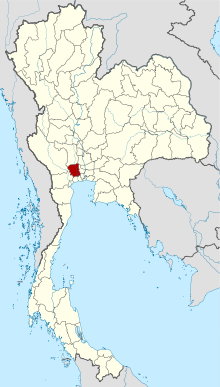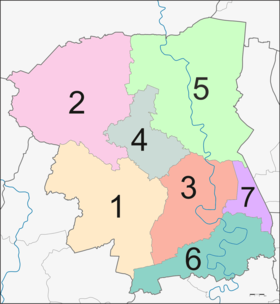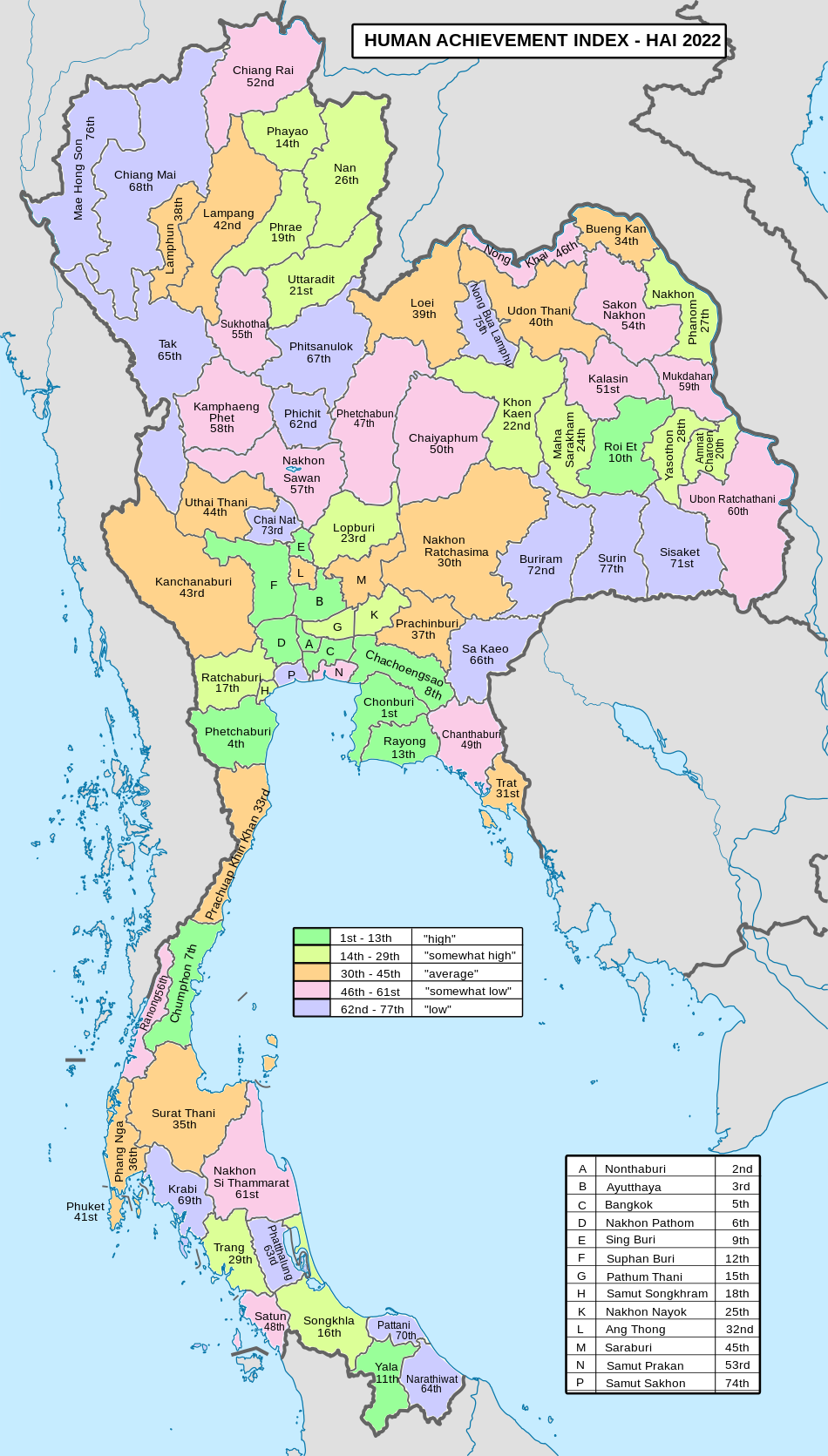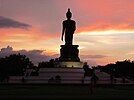Nakhon Pathom province
Nakhon Pathom
จังหวัดนครปฐม | |
|---|---|
| Other transcription(s) | |
| • Teochew | 佛統 bhūk.tóum (Peng'im) |
(Clockwise from top left) Phra Pathommachedi, Sanam Chandra Palace, Phutthamonthon Buddhism Park, Don Wai Market, Thai Human Imagery Museum, Prince Mahidol Hall of Mahidol University Salaya Campus | |
| Motto(s): ส้มโอหวาน ข้าวสารขาว ลูกสาวงาม ข้าวหลามหวานมัน สนามจันทร์งามล้น พุทธมณฑลคู่ธานี พระปฐมเจดีย์เสียดฟ้า สวยงามตาแม่น้ำท่าจีน ("Sweet pomelos. White rice. Beautiful women. Sweet and rich Khao Lam. Stunning Sanam Chan (Palace). Home of Phutthamonthon. Sky-high Phra Pathom Chedi. Attractive Tha Chin River.") | |
 Map of Thailand highlighting Nakhon Pathom province | |
| Country | Thailand |
| Capital | Mueang Nakhon Pathom |
| Government | |
| • Governor | Surasak Charoensirichot (since 2020) |
| Area | |
| • Total | 2,168 km2 (837 sq mi) |
| • Rank | Ranked 66th |
| Population (2019)[2] | |
| • Total | 920,030 |
| • Rank | Ranked 25th |
| • Density | 424/km2 (1,100/sq mi) |
| • Rank | Ranked 8th |
| Human Achievement Index | |
| • HAI (2022) | 0.6698 "high" Ranked 6th |
| GDP | |
| • Total | baht 333 billion (US$11.3 billion) (2019) |
| Time zone | UTC+7 (ICT) |
| Postal code | 73xxx |
| Calling code | 034 & 02 |
| ISO 3166 code | TH-73 |
| Website | www |
Nakhon Pathom (Thai: จังหวัดนครปฐม, pronounced [náʔkʰɔ̄ːn pā.tʰǒm], (Pronunciation)) is one of the central provinces (changwat) of Thailand. Neighbouring provinces are (from north clockwise) Suphan Buri, Ayutthaya, Nonthaburi, Bangkok, Samut Sakhon, Ratchaburi, and Kanchanaburi. The capital city of Nakhon Pathom province is Nakhon Pathom.
Nakhon Pathom province is home to the Phra Pathommachedi, a chedi commissioned by King Mongkut (Rama IV) and completed by King Chulalongkorn (Rama V) in 1870. The chedi is a reminder of the long vanished Dvaravati civilization that once flourished here and by tradition Nakhon Pathom is where Buddhism first came to Thailand.[citation needed] The province itself is known for its many fruit orchards.[5]
Geography
[edit]Nakhon Pathom is a small province 56 km from Bangkok. It is in the alluvial plain of central Thailand and is drained by the Tha Chin River (known locally as the Nakhon Chai Si), a tributary of the Chao Phraya River. There are many canals that have been dug for agriculture. The total forest area is just 1.6 km2 (0.62 sq mi) or 0.8 per mille of provincial area.[6] The Thai capital Bangkok has grown until it borders Nakhon Pathom.
Climate
[edit]Nakhon Pathom province has a tropical savanna climate (Köppen climate classification category Aw). Winters are dry and warm. Temperatures rise until May. Monsoon season runs from May through October, with heavy rain and somewhat cooler temperatures during the day, although nights remain warm. Climatological data for the years 2012–2013: Its maximum temperature is 40.1 °C (104.2 °F) in April 2013 and the lowest temperature is 12.0 °C (53.6 °F) in December 2013. The highest average temperature is 37.4 °C (99.3 °F) in April 2013 and the minimum average temperature is 16.5 °C (61.7 °F) in December 2013. The average relative humidity is 75% and the minimum relative humidity is 22%. Annual rainfall is 1,095 millimeters. The number of rainy days was 134 days for the year 2013.
Toponymy
[edit]The name derives from the Pali words Nagara Pathama, meaning 'first city', and Nakhon Pathom is often referred as Thailand's oldest city.[citation needed] Archaeological remains have been linked to the (pre-Thai) Dvaravati kingdom, dating to the 6th through 11th centuries.[5]
History
[edit]Nakhon Pathom Province centuries ago was a coastal city on the route between China and India; due to sedimentation from the Chao Phraya River, the coastline moved much farther to sea. When the Tha Chin River changed its course, the city lost its main water source and thus was for hundreds of years deserted, the population moving to a city called Nakhon Chai Si (or Sri Wichai). King Mongkut (Rama IV) ordered the restoration of the Phra Pathom Chedi, which was then crumbling and abandoned in the jungle. A city gradually formed around it, bringing new life to Nakhon Pathom. A museum presents the archaeological record of the city's history.[7]
Major settlement of the province included immigration beginning in the reign of King Buddha Loetla Nabhalai (Rama II), which included Khmer villages (e.g., Don Yai Hom), the Lan Na-populated (Baan Nua) and Lao Song villages (e.g., Don Kanak), as well as a major influx of southern Chinese in the late-1800s and early-1900s. Today Nakhon Pathom attracts people from all over Thailand, most notably from Bangkok and Isan, plus Burmese migrant workers. The province includes industrial zones, major university towns, government offices relocated from Bangkok, and agricultural and transport hubs.[5]
Economy
[edit]In mid-2019, the Department of Airports (DOA) proposed the construction of a new airport in the province, to relieve pressure on Bangkok's two existing airports. The 20 billion baht airport would occupy 3,500 rai of land in Bang Len District and Nakhon Chai Si District. Its capacity would be 25 million passengers annually. If approved, construction would start in 2023 and the airport would be operational by 2025 or 2026.[8] When fully built-out, the airport will accommodate 80-100 seat aircraft flying between Bangkok and second-tier provinces to ease congestion at Suvarnabhumi and Don Mueang airports. The project site has low population density, only 200 households on 400 plots of land.[9]
Health
[edit]Nakhon Pathom's main hospital is Nakhon Pathom Hospital, operated by the Ministry of Public Health.
Symbols
[edit]The provincial seal shows Phra Pathom Chedi, at 127 meters the tallest pagoda in the world.[citation needed] It is in the center of the city of Nakhon Pathom, and has been an important Buddhist center since the 6th century. The current building was created by King Mongkut in 1860. On the pagoda a royal crown is depicted, the symbol for King Mongkut's work on reconstructing the pagoda.
The provincial flag is blue with the yellow provincial seal in the middle of the flag.[10]
The provincial tree Diospyros decandra (known as "chan" in Thai). The provincial aquatic life is the giant river prawn (Macrobrachium rosenbergii) (known as "kung mae-nam" or "kung kam-kram" in Thai).
The provincial slogan is "sweet pomelos, delicious rice, beautiful young ladies".[5]
Administrative divisions
[edit]Provincial government
[edit]

The province is divided into seven districts (amphoes). The districts are further subdivided into 106 subdistricts (tambons) and 904 villages (mubans).
Local government
[edit]As of 10 October 2020 there are: one Nakhon Pathom Provincial Administrative Organization - PAO (ongkan borihan suan changwat) and twenty-six municipal (thesaban) areas in the province. The capital Nakhon Pathom has city (thesaban nakhon) status. Further five have town (thesaban mueang) status and twenty subdistrict municipalities (thesaban tambon).[2]
| City municipality | people | ||
| 1 | Nakhon Pathom[11] | 74,446 |
| Town municipalities | people | 3 | Sam Phran[12] | 17,329 | |
| 1 | Rai Khing[13] | 32,819 | 4 | Nakhon Pathom[14] | 14,004 |
| 2 | Krathum Lom[15] | 27,587 | 5 | Sam Khwai Phueak[16] | 11,139 |
| Subdistrict mun. | people | ||||
| 1 | Om Yai[17] | 24,027 | 11 | Khun Kaeo[18] | 7,915 |
| 2 | Sam Ngam[19] | 13,956 | 12 | Sisa Thong[20] | 7,221 |
| 3 | Bang Kratheuk | 13,056 | 13 | Thammasala[19] | 7,086 |
| 4 | Sala Ya[21] | 11,180 | 14 | Kamphaeng Saen[19] | 7,009 |
| 5 | Phrong Maduea | 10,896 | 15 | Ta Kong | 6,785 |
| 6 | Khlong Yong | 10,526 | 16 | Don Yai Hom[22] | 6,519 |
| 7 | Bo Phlap[23] | 9,519 | 17 | Huai Phlu[19] | 2,217 |
| 8 | Map Khae | 8,630 | 18 | Bang Luang[19] | 2,163 |
| 9 | Bang Len[19] | 8,429 | 19 | Rang Krathum[19] | 2,162 |
| 10 | Nakhon Chai Si[19] | 8,226 | 20 | Lam Phaya[19] | 1,949 |
The non-municipal areas are administered by 91 Subdistrict Administrative
Organizations (SAO) (ongkan borihan suan tambon).[24]
| Municipalities | Communities | Groups | |
| Rai Khing[25] | 28 | 3 | |
| Krathum Lom[26] | 29 | - | |
| Om Yai[27] | 26 | - |
Human achievement index 2022
[edit]| Health | Education | Employment | Income |
| 6 | 4 | 19 | 9 |
| Housing | Family | Transport | Participation |

|
 |

|
|
| 74 | 33 | 11 | 56 |
| Province Nakhon Pathom, with an HAI 2022 value of 0.6698 is "high", occupies place 6 in the ranking. | |||
Since 2003, United Nations Development Programme (UNDP) in Thailand has tracked progress on human development at sub-national level using the Human achievement index (HAI), a composite index covering all the eight key areas of human development. National Economic and Social Development Board (NESDB) has taken over this task since 2017.[3]
| Rank | Classification |
| 1–13 | "High" |
| 14–29 | "Somewhat high" |
| 30–45 | "Average" |
| 46–61 | "Somewhat low" |
| 62–77 | "Low" |
| Map with provinces and HAI 2022 rankings |

|
References
[edit]- ^ Advancing Human Development through the ASEAN Community, Thailand Human Development Report 2014, table 0:Basic Data (PDF) (Report). United Nations Development Programme (UNDP) Thailand. pp. 134–135. ISBN 978-974-680-368-7. Retrieved 17 January 2016, Data has been supplied by Land Development Department, Ministry of Agriculture and Cooperatives, at Wayback Machine.
{{cite report}}: CS1 maint: postscript (link)[dead link] - ^ a b "สถิติทางการทะเบียน" [Registration statistics]. bora.dopa.go.th. Department of Provincial Administration (DOPA). December 2019. Retrieved 10 October 2020.
Download จำนวนประชากร ปี พ.ศ.2562 - Download population year 2019
- ^ a b "ข้อมูลสถิติดัชนีความก้าวหน้าของคน ปี 2565 (PDF)" [Human Achievement Index Databook year 2022 (PDF)]. Office of the National Economic and Social Development Council (NESDC) (in Thai). Retrieved 12 March 2024, page 32
{{cite web}}: CS1 maint: postscript (link) - ^ "Gross Regional and Provincial Product, 2019 Edition". <>. Office of the National Economic and Social Development Council (NESDC). July 2019. ISSN 1686-0799. Retrieved 22 January 2020.
- ^ a b c d "Official Infos about Nakhon Pathom" (PDF). Archived from the original (PDF) on 2012-05-09. Retrieved 2019-08-16.
- ^ "ตารางที่ 2 พี้นที่ป่าไม้ แยกรายจังหวัด พ.ศ.2562" [Table 2 Forest area Separate province year 2019]. Royal Forest Department (in Thai). 2019. Retrieved 6 April 2021, information, Forest statistics Year 2019
{{cite web}}: CS1 maint: postscript (link) - ^ "History". Province Nakhon Pathom. nakhonpathom.go.th. 2019. Retrieved 20 November 2019.
- ^ Hongtong, Thodsapol (20 July 2019). "Third Bangkok airport proposed". Bangkok Post. Retrieved 25 July 2019.
- ^ Hongthong, Thodsapol (22 September 2019). "New airport under scrutiny". Bangkok Post. Retrieved 22 September 2019.
- ^ "Logo". Province Nakhon Pathom. nakhonpathom.go.th. 2019. Retrieved 20 November 2019.
- ^ "พระราชกฤษฎีกา จัดตั้งเทศบาลนครนครปฐม จังหวัดนครปฐม พ.ศ.๒๕๔๒" [Royal Decree Establish of Nakhon Nakhon Pathom city municipality, Nakhon Pathom province B.E.2542 (1999)] (PDF). Royal Thai Government Gazette. 116 (110 Kor): 6–9. 10 November 1999. Archived from the original (PDF) on November 10, 2011. Retrieved 14 December 2019.
- ^ "เทศบาลเมืองสามพราน" [Samphran Municipality]. samphrancity.go.th (in Thai). 2020. Retrieved 10 October 2020.
changed its status from Samphran subdistrict municipality to Samphran town municipality. Since 1 February 2008.
- ^ "ประวัติความเป็นมา" [History]. raikhing.go.th (in Thai). 2020. Retrieved 10 October 2020.
The first Subdistrict Administrative Organization (SAO) has raised its position as the Rai Khing town municipality on 30 May 2008.
- ^ "Number of local government organizations: Summary elevating local authorities". dla.go.th. Department of Local Administration (DLA). 1 February 2013. Retrieved 10 October 2020.
No.3.2 Established Nakhon Pathom Subdistrict Administrative Organization (SAO), Mueang district, Nakhon Pathom province is Nakhon Pathom town municipality, effectively 1 March 2013.
- ^ "ประวัติความเป็นมา" [History]. krathumlom.go.th (in Thai). 2020. Retrieved 10 October 2020.
It was later established as Krathum Lom town municipality on 2 June 2008.
- ^ "ประกาศกระทรวงมหาดไทย เรื่อง จัดตั้งองค์การบริหารส่วนตำบลสามควายเผือก อำเภอเมืองนครปฐม จังหวัดนครปฐม เป็นเทศบาลเมืองสามควายเผือก" [Notification of the Ministry of Interior Re: Establishment of Sam Kwai Phueak Subdistrict Administrative Organization, Mueang Nakhon Pathom district, Nakhon Pathom province Is Sam Kwai Phueak town municipality] (PDF). Royal Thai Government Gazette. 136 (Special 237 Ngor): 18. 23 September 2019. Archived from the original (PDF) on September 23, 2019. Retrieved 5 September 2020.
- ^ "ประวัติเทศบาล" [Municipal history]. omyai.go.th (in Thai). 2020. Retrieved 10 October 2020.
and was raised as a municipality by the Change Sanitation districts to Municipality Act, 24 February B.E.2542 effective on 25 May 1999.
- ^ "Number of local government organizations: Summary elevating local authorities". dla.go.th. Department of Local Administration (DLA). 11 December 2012. Retrieved 10 October 2020.
No.3.3 Established Khun Kaeo Subdistrict Administrative Organization (SAO), Nakhon Chai Si district, Nakhon Pathom province is Khun Kaeo subdistrict municipality, effectively 31 January 2013.
- ^ a b c d e f g h i "พระราชกฤษฎีกา เปลี่ยนแปลงฐานะของสุขาภิบาลเป็นเทศบาล พ.ศ.๒๕๔๒" [Royal Decree Change Sanitation districts to Municipality Act B.E.2542] (PDF). Royal Thai Government Gazette. 116 (9 Kor): 1–4. 24 February 1999. Archived from the original (PDF) on April 9, 2008. Retrieved 10 October 2020, effective 25 May 1999.
{{cite journal}}: CS1 maint: postscript (link) - ^ "Number of local government organizations: Summary elevating local authorities". dla.go.th. Department of Local Administration (DLA). 11 February 2020. Retrieved 10 October 2020.
No.1.9 Established Sisa Thong Subdistrict Administrative Organization (SAO), Nakhon Chai Si district, Nakhon Pathom province is Sisa Thong subdistrict municipality, effectively 17 April 2020.
- ^ "ประวัติความป็นมา" [History]. salaya.go.th (in Thai). 2020. Retrieved 10 October 2020.
Change the status from Sanitation district to Sala Ya subdistrict municipality. According to the Change Sanitation districts to Municipality Act, 24 February B.E.2542 effective on 25 May 1999.
- ^ "ประวัติความป็นมา" [History]. donyaihom.go.th (in Thai). 2020. Retrieved 10 October 2020.
Don Yai Hom subdistrict municipality was elevated from Don Yai Hom sanitation district on 25 may 1999 to Don Yai Hom subdistrict municipality, located in Mueang district, Nakhon Pathom province.
- ^ "Number of local government organizations: Summary elevating local authorities". dla.go.th. Department of Local Administration (DLA). 27 February 2012. Retrieved 10 October 2020.
No.3.42 Established Bo Phlap Subdistrict Administrative Organization (SAO), Mueang district, Nakhon Pathom province is Bo Phlap subdistrict municipality, effectively 1 June 2012.
- ^ Department of Provincial Administration (DOPA), List of 5,324 SAO's information as of date 20 December 2019, 91 SAO's (no.1084-1175) were established in 1995 (16), in 1996 (58) and in 1997 (17).
- ^ "ข้อมูลชุมชน" [Community information]. raikhing.go.th (in Thai). 2020. Retrieved 30 October 2020.
28 communities in 3 groups.
- ^ "ผูันำชุมชน" [Community leaders]. krathumlom.go.th (in Thai). 2020. Retrieved 30 October 2020.
29 communities.
- ^ "ชุมชน" [Municipal community]. omyai.go.th (in Thai). 2020. Retrieved 30 October 2020.
26 communities.
External links
[edit] Nakhon Pathom travel guide from Wikivoyage
Nakhon Pathom travel guide from Wikivoyage- Province page from the Tourist Authority of Thailand
- Website of province (Thai only)









